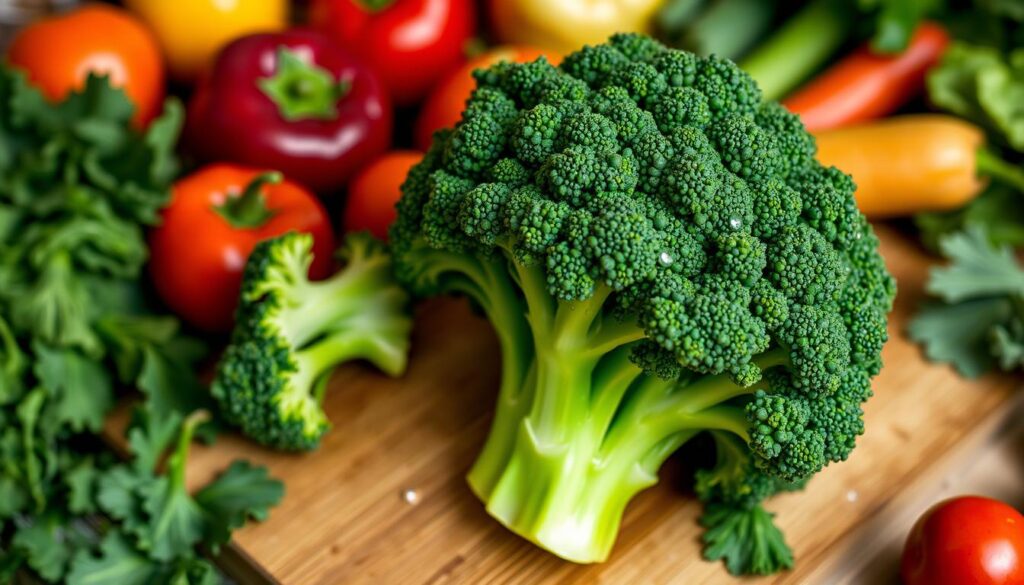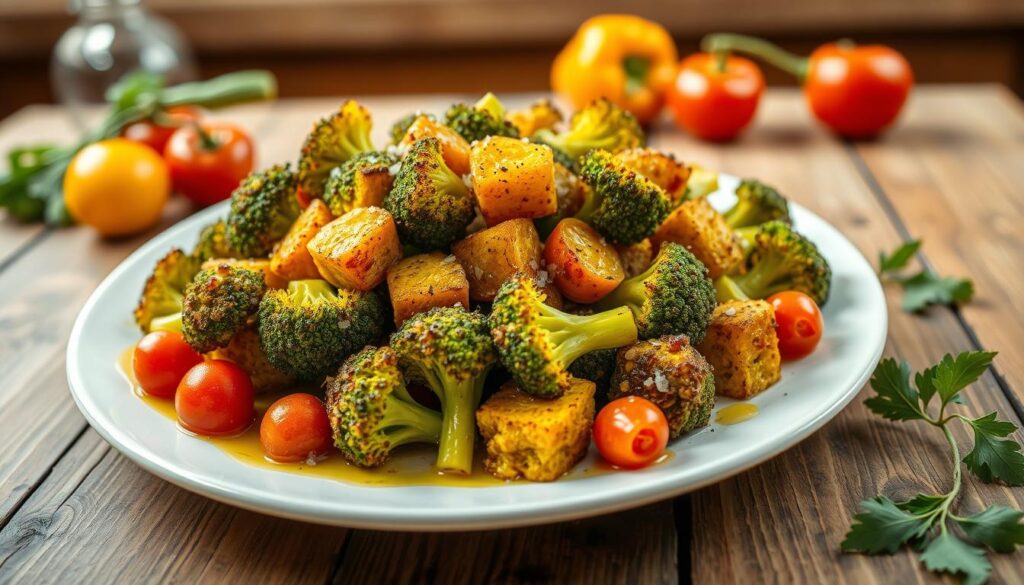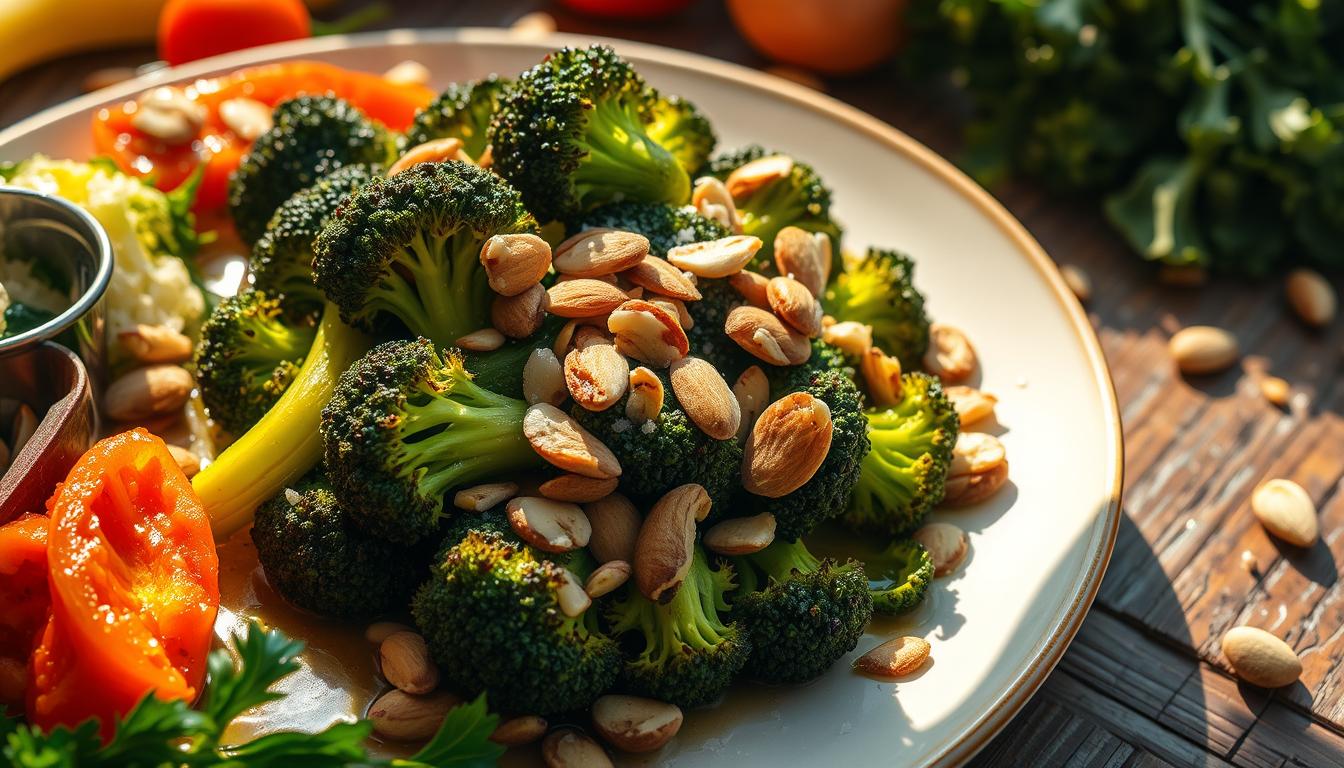I once doubted my favorite roasted broccoli recipe. Was I ruining all those great nutrients by making it crispy? Many health-focused cooks wonder if roasting broccoli hurts its nutritional value.
Broccoli is a nutritional powerhouse, full of vitamins and minerals that boost your health. Roasting broccoli might seem to reduce its benefits. But, the truth is, roasting can make it taste better while keeping most nutrients intact.
Wondering if broccoli stays healthy when roasted? It does, if you roast it right. The trick is to know how cooking affects its nutrients.
In this article, we’ll explore the science of roasting broccoli. You’ll learn how temperature, cooking time, and prep methods can keep its nutrients high. This way, you’ll enjoy a tasty and healthy side dish.
Understanding the Nutritional Value of Raw Broccoli
Broccoli is a nutritional powerhouse. It’s packed with nutrients that boost your health and wellness.

Key Vitamins and Minerals in Fresh Broccoli
Raw broccoli is a nutritional treasure. One cup offers amazing health benefits:
- Over 135% of daily vitamin C intake
- 116% of recommended vitamin K
- Only 31 calories per cup
- 2.5g of protein
- 2.4g of dietary fiber
The Role of Antioxidants in Raw Broccoli
Broccoli antioxidants fight cellular damage. It has high levels of phytonutrients. These combat free radicals and may lower disease risks.
Natural Fiber Content and Its Benefits
Understanding fiber in broccoli is key. It has 2.4g of fiber per cup. This supports digestive health and may control blood sugar.
Its low glycemic index of 10 prevents quick blood sugar spikes. Eating broccoli regularly may lower risks of type 2 diabetes, heart disease, and some cancers. It’s a great addition to your diet.
Is Broccoli Steady Healthy When Roasted?

Roasting broccoli turns this healthy veggie into a tasty treat. It keeps most of its great health perks. Cooking it right keeps its nutrients in check.
Roasting broccoli does more than just taste good. Cooking it at 400°F for 25-30 minutes boosts its health benefits. Roasting:
- Increases antioxidants
- Makes it crispy for better taste
- Keeps most vitamins and minerals
Baked broccoli keeps its nutrients close to raw broccoli. Just don’t overcook it. A bit of olive oil helps absorb vitamins like vitamin K and vitamin A.
Science backs up roasted broccoli’s health benefits. It shows cooking can make nutrients easier to use. So, it’s a great pick for those watching their health.
- Has about 35mg of vitamin C per 80g
- Offers 2.2g of dietary fiber
- Includes sulforaphane
Roasted broccoli can be a nutritional gem if done right. It’s all about keeping its health perks while making it delicious.
The Science Behind Roasting Broccoli
Roasting broccoli is more than just cooking. It’s a science that turns this healthy veggie into a tasty dish. It also helps keep its nutrients. Learning about cooking veggies can make you better at preparing healthy meals.
Temperature Effects on Nutrients
Temperature is key when roasting broccoli. The right temperature helps keep its nutrients. Studies show that roasting at 400°F (220°C) is best for flavor and nutrition.
- Roasting temperatures between 375-425°F are ideal
- Maintain even heat distribution
- Avoid excessive high temperatures that can destroy nutrients
Chemical Changes During Roasting
Roasting broccoli changes it in amazing ways. It breaks down cell walls, releasing sulforaphane, a strong antioxidant. This change makes the veggie healthier and gives it a tasty caramelized outside.
Optimal Cooking Duration
Timing is everything when roasting broccoli. Roast it for 20-25 minutes for the best taste and texture. Cooking it too long can lose nutrients, so keep an eye on it.
- Initial roasting time: 20-25 minutes
- Check for golden-brown edges
- Toss midway for even cooking
Benefits of Roasting Over Other Cooking Methods
Roasting is a top choice for cooking broccoli. It keeps more nutrients than boiling and makes the broccoli taste better and feel crunchier.
Here’s why roasting is a big win for healthy veggies:
- Nutrient Retention: Roasting keeps more vitamins and minerals because it uses less water
- Flavor Enhancement: The high heat caramelizes the sugars, making it taste amazing
- Texture Improvement: Roasted broccoli gets a nice crunch that’s better than steaming
Roasting broccoli also boosts its health benefits. Studies show that cooking at 400°F makes some nutrients easier for our bodies to use. This means we get more of the good stuff from broccoli.
Roasting beats boiling or microwaving in both taste and nutrition. By controlling the heat and time, you can make broccoli into a tasty, healthy dish.
Nutrient Retention in Roasted Broccoli
Roasting broccoli is a tasty way to keep its nutrients. It’s important to know how cooking changes broccoli’s nutritional value. This helps you make better food choices.
Vitamin C Content After Roasting
Vitamin C in broccoli is sensitive to heat. Roasting at 400˚F for 15-20 minutes can reduce it. You’ll likely keep about 70-80% of the vitamin C.
Mineral Preservation
Roasted broccoli keeps most of its minerals. Potassium, calcium, and iron stay mostly the same. So, you get lots of mineral benefits from roasted broccoli.
- Potassium content remains stable
- Calcium preservation is excellent
- Iron levels stay consistent
Fiber Content Changes
Roasting barely changes broccoli’s fiber. It might make fiber easier to digest. A serving of roasted broccoli has about 4 grams of fiber.
Perfect Temperature and Time Guidelines for Healthy Roasting
Mastering the art of roasting broccoli needs precision in temperature and timing. This approach can greatly enhance both flavor and nutritional value in healthy vegetable preparation.
For the best roasting results, follow these key guidelines:
- Preheat your oven to 425°F (220°C)
- Prepare broccoli florets in uniform sizes
- Spread vegetables in a single layer on baking sheet
- Roast for approximately 20 minutes
Vegetable cooking methods can greatly affect nutrient retention. The recommended 425°F temperature caramelizes broccoli’s natural sugars while keeping essential vitamins. Avoid overcrowding the baking sheet to prevent steaming instead of roasting.
When roasting broccoli, look for these visual cues:
- Edges should be crispy and slightly charred
- Color remains vibrant green
- Texture is tender yet firm
Pro tip: Start checking your broccoli at the 20-minute mark. Depending on your oven and floret size, you might need an additional 5-7 minutes for perfect crispiness.
The Role of Oil in Roasted Broccoli Preparation
Choosing the right oil is key to a great roasting broccoli experience. Oil boosts flavor and nutrition in vegetable cooking.
Knowing how oil affects your broccoli can make your meals tasty and healthy. The right oil prevents sticking and increases nutrient absorption.
Best Oils for Roasting
- Olive Oil: A heart-healthy choice with low smoke point
- Avocado Oil: High smoke point, rich in monounsaturated fats
- Ghee: Provides rich flavor and high heat tolerance
- Coconut Oil: Adds unique flavor and has antimicrobial properties
Oil Amount Recommendations
Experts suggest using about 1 tablespoon of oil per large head of broccoli. This amount ensures even coating without greasiness.
Roasting at 375-425°F with a light oil coating breaks down broccoli’s cell walls. This makes nutrients more accessible. The oil also helps distribute heat and increases absorption of vitamins A and K.
Remember, the goal is to enhance your broccoli’s natural goodness through smart, healthy vegetable preparation techniques.
Maximizing Nutritional Benefits While Roasting
Roasting broccoli doesn’t mean losing its nutritional value. You can actually boost its nutrients with smart preparation. To get the most from roasted broccoli, use thoughtful cooking methods and add the right ingredients.
Pairing foods can greatly improve how well you absorb nutrients. Here are some great combinations for healthy vegetable preparation:
- Pair roasted broccoli with vitamin C-rich foods like citrus fruits to boost iron absorption
- Add a drizzle of olive oil to help absorb fat-soluble vitamins
- Sprinkle nuts or seeds for additional protein and mineral content
Herbs and spices are key for better flavor and nutrition. Turmeric, for example, adds curcumin, which boosts broccoli’s antioxidants. Garlic and black pepper can also increase broccoli’s health benefits.
Your roasting method is important. Use temperatures between 180°C to 220°C and roast for 10-15 minutes. This method keeps nutrients intact while making the broccoli deliciously caramelized. Avoid overcooking to keep the nutrients in.
By following these tips, you can turn roasted broccoli into a nutritional powerhouse. It will support your health and wellness.
Common Mistakes That Reduce Nutritional Value
Roasting broccoli can be tricky. Small mistakes can greatly affect its nutritional value. Knowing how to prepare vegetables well is key to getting the most health benefits.
Cooking cruciferous vegetables needs careful attention. Here are the most common mistakes that can harm your broccoli’s nutrition:
Overcooking Risks
Overcooking can destroy important nutrients in broccoli. Studies show that too much heat can cut vitamin levels by up to 50%. To keep nutrients intact, follow these tips:
- Limit roasting time to 10-15 minutes
- Maintain oven temperature between 400-425°F
- Check broccoli regularly to prevent burning
Temperature Challenges
Temperature control is vital in cooking vegetables. Extreme heat can damage essential nutrients. For the best results, manage the temperature carefully:
- Preheat oven to exactly 400°F
- Use a reliable oven thermometer
- Avoid temperatures exceeding 425°F
By following these tips, you’ll get the most nutritional value and enjoy delicious roasted broccoli.
Creative Ways to Serve Healthy Roasted Broccoli
Roasted broccoli is more than just a side dish. It’s a versatile ingredient that can make your meals better. Its rich nutrients make it a great addition to your diet.
Find out how to make the most of roasted broccoli:
- Salad Topper: Sprinkle roasted broccoli florets over mixed greens for added crunch and nutrition
- Pasta Companion: Mix roasted broccoli into whole grain pasta with light parmesan cheese
- Grain Bowl Base: Create nutrient-dense grain bowls with quinoa, roasted broccoli, and lean protein
- Breakfast Boost: Add chopped roasted broccoli to scrambled eggs or frittatas
Try adding garlic, lemon zest, or red pepper flakes for extra flavor. A drizzle of olive oil and sea salt can make it a gourmet dish.
Pro tip: Roast in a single layer at 400 degrees F for 16-18 minutes. This ensures perfect caramelization and keeps the nutrients.
Storage Tips to Maintain Nutritional Value
Keeping the nutrients in roasted broccoli alive means using the right storage methods. Your hard work in cooking doesn’t stop there. Storing it properly is key to keeping its nutritional value high and preventing it from going bad.
For short-term storage, follow these refrigeration tips:
- Cool roasted broccoli completely before storing
- Use airtight containers to prevent moisture loss
- Store in the refrigerator within 2 hours of cooking
- Consume within 3-4 days for best quality
Freezing roasted broccoli? Here’s how to keep its nutrients intact:
- Let broccoli cool to room temperature
- Spread pieces on a baking sheet to prevent clumping
- Freeze for 1-2 hours before transferring to freezer bags
- Remove excess air from storage bags
- Label with the date of freezing
Pro tip: Frozen roasted broccoli maintains optimal nutrition for up to 6-8 months when stored correctly.
Watch for signs of spoilage like unusual odors, discoloration, or slimy texture. Always check your stored broccoli before reheating and eating. This ensures food safety and keeps nutritional benefits high.
Conclusion
Roasted broccoli is a nutritional powerhouse in healthy vegetable preparation. Is broccoli healthy when roasted? Yes, it is. You can keep its nutrients high and enjoy a crispy texture by using the right techniques.
Roasted broccoli offers more than just taste. It’s low in carbs, high in fiber, and packed with vitamins. To keep it nutritious, cook it at moderate temperatures, use little oil, and don’t overcook it. This way, you save vitamins C, K, and antioxidants like sulforaphane.
Roasting broccoli is about more than just eating well. It’s about making meals that taste great and help your health. By following the tips in this article, you can make broccoli a key part of your diet. It can help strengthen bones, reduce inflammation, and boost your overall health.
Roasting broccoli is all about finding a balance. It’s about enjoying its health benefits and satisfying your taste buds. Your body will thank you for choosing nutritious, delicious meals.
FAQ
Does roasting broccoli reduce its nutritional value?
Roasting broccoli doesn’t get rid of all its good stuff. Some vitamins like vitamin C might go down a bit. But, many nutrients stay the same or even get better.
In fact, roasting can make some antioxidants and minerals easier for your body to use.
What is the best temperature for roasting broccoli to maintain its nutrients?
Roast broccoli at 400-425°F (204-218°C) for the best results. This temperature helps keep it crispy on the outside and nutritious inside. Cooking for 15-20 minutes is key to keeping nutrients in.
Can roasted broccoli be considered a healthy food option?
Yes, it’s very healthy! Roasted broccoli keeps most of its good stuff like minerals and fiber. Roasting can even make some nutrients easier to get and taste better.
What type of oil should I use when roasting broccoli?
Use extra virgin olive oil for roasting broccoli. It’s good for high heat and adds healthy fats. Avocado oil is also great because it can handle high temperatures and adds extra nutrition.
How long can I store roasted broccoli?
Store roasted broccoli in an airtight container in the fridge for 3-5 days. Keep it in a sealed container to keep it fresh. Reheat it gently to preserve its nutrients and texture.
Does roasting affect broccoli’s fiber content?
Roasting doesn’t cut down broccoli’s fiber much. The cooking might change the fiber a bit, but it’s mostly the same. So, you’ll get the same health benefits from broccoli’s fiber.
Are there any nutrients that become more available through roasting?
Yes, roasting can make some nutrients easier to get. Heat can break down cell walls, making antioxidants like beta-carotene and lutein more absorbable. Also, using a bit of healthy oil can help your body use fat-soluble vitamins better.

